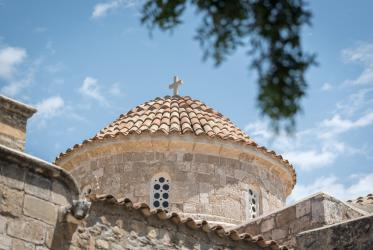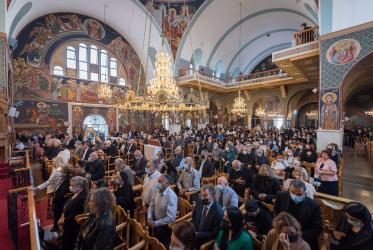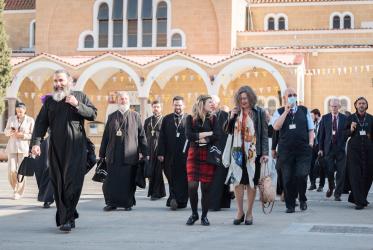by Georges Tsetsis
According to the constitution of the World Council of Churches "the primary purpose of the fellowship of the churches in the WCC, is to call one another to visible unity in one faith and in one eucharistic fellowship, expressed in worship and common life in Christ, through witness and service to the world, and to advance towards that unity in order that the world may believe" (Article III).
The guiding principle behind this fundamental affirmation is that the church, as body of Christ, cannot be divided, and that church unity should be seen as an integral part of the saving message of the gospel, which cannot be proclaimed in its authenticity while churches are divided and separated.
Thus, the WCC as an institution dedicated to the service of the churches for fifty years or so, has acted as their specific instrument in the common effort to promote Christian unity, to give witness to Christ and to serve the world. During these five decades of the life of the WCC, its member churches, Orthodox and non-Orthodox alike, tried to respond to the aspiration and to the existential needs of the people of God around the world. This was the outcome of the belief that the church, above everything else is the manifestation of the presence of God in the world, the sign of the continuous intervention of the love of God in our life, and that, therefore, the responsibility of the church is to bring to the world today torn apart by hatred, material and spiritual poverty, the liberating action of God. In this respect the churches constituting the WCC, during the past fifty yeas reflected and acted together, being deeply convinced that the council as an instrument of churches engaged in theological dialogue as well as in love and mutual solidarity, should persist in its efforts towards a broader and even more positive encounter with the suffering humankind.
Yet, this co-operation and interaction was not always obvious. On the contrary, it proved to be difficult, and sometimes painful, precisely because of the very nature of the WCC as "fellowship" of two distinct groups of churches which belong to two diametrically opposed traditions in terms of theology, ecclesiology and, very often, Christian ethics.
Hence, the Thessaloniki Eastern Orthodox meeting, the Harare debate and its decision to create the "Special Commission on Orthodox Participation in the World Council of Churches".
All of us attended the Morges meeting, listened to each other and agreed to seek together those working conditions which will facilitate in the future a better, more effective and meaningful co-operation between Orthodox and non-Orthodox within the WCC.
According to the working agenda of Sub-Committee IV of the Special Commission on "Existing models and new proposals for a structural framework of the WCC", our main task is:
- To take account of various proposals and ideas that have emerged so far in describing our ecumenical fellowship.
- To examine the various options with regard to any new organizational framework of the WCC.
- To consider the various models of "fora" relating to the structure of the WCC.
In addition to these three tasks our Sub-Committee was also asked to take full account of the material contained in Parts 3 and 4 of the "Preliminary Orthodox Proposals" presented to the Special Commission by Metropolitan Chrysostomos of Ephesus.
My feeling is that presently it is quite premature to bring forward any concrete proposal with regard to a new structural framework of the council. Before doing so we need, I believe, to formulate a clearer understanding both of the fellowship we experience in the WCC and of the goals we are supposed to pursue in it. In other words, we need a second careful reading of the CUV document in order to refresh our memories. In many cases CUV provides pertinent answers to several questions raised during the meeting of the Special Commission.
This is why at this stage of our reflection I will try to express some thoughts only on the above mentioned parts of the "Preliminary Orthodox Proposals".
Reflecting the views of the Orthodox participants, Metropolitan Chrysostomos of Ephesus expressed some fears about a possible universalization of the ecumenical movement or a globalization of the ecumenical idea and of the ecumenical movement. And he concluded by stating that "in view of such a very likely siege of the ecumenical idea and reality, we need to consolidate and affirm our determination to stick to the ecumenical movement we have created, this movement that we have already experienced".
This genuine concern, which was formulated on many occasions in the last two decades, no doubt stems out of the desire and determination of the Orthodox to remain in the WCC and to enhance its multi-dimensional work.
What is the fear expressed part 3 of Metropolitan Chrysostomos' report?
Many might remember that n various debates about the evolution of the ecumenical movement and the present state of the WCC, it was rightly pointed out that the vision of the council is a multi-faceted one, pursued within an increasingly plural context. This is true. In the course of the more recent debate n the future of the WCC, however, it is frequently stated that unity should not be understood as unity of the churches alone, but of the whole human community, for the oikoumene is the whole inhabited earth, not just the Christian part of it. The CUV document echoed this trend by stating that "a growing number of voices from the churches, especially in Asia, but also in Latin America, have spoken of the need for a wider ecumenism or macro-ecumenism, an understanding which would open the ecumenical movement to other religions and cultural traditions beyond the Christian community" (chapter 2, § 6). The CUV document continued remarking that the "ambiguities surrounding the understanding of the term ecumenical' create (the) real danger of introducing competitive divisions into the ecumenical movement". And consequently it puts the following question: "What is the meaning and purpose of this movement?" (2.7)
This is precisely what the Orthodox wish to debate in the framework of the Special Commission, for they believe that the drawing of the boundaries of the oikumene within which the WCC is called to serve, is a question of utmost importance.
Nikos Nissiotis of blessed memory once pointed out that "the ecumenical movement has to be understood as the dynamic process of mutual exchange by the churches of their charismata, in the fulfilment of their common calling by God to be the channels of his grace for the whole world, in the name of Christ and in the power of the Holy Spirit".1 This being the case I believe that the confession of our faith in the Triune God, contained in the constitutional basis of the WCC, and our affirmation that our "visible unity in one faith and in one eucharistic fellowship" is sought "in order that the world may believe", express precisely this fundamental principle and provide the framework in which the council should exist and operate.
Even if the space in which the WCC moves and acts is the oikoumene, the whole inhabited earth, the ecumenical movement, the major institutional expression of which is the WCC, is above all a movement seeking to manifest the fundamental unity and universality of the church of Christ. The council's constitution is unequivocally clear on this point.
Notes:
- N. Nissiotis, What Unity implies, WCC Studies, No. 7, Geneva 1969, p. 19.




